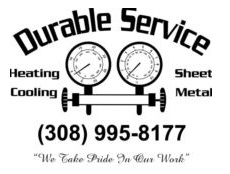Completing the search for your first home is thrilling. You’re probably juggling a dozen things or more to ensure you’re making the right choice. We believe that gaining insight into your potential new HVAC system is crucial. The property’s HVAC system represents a substantial investment and source of potential long-term costs, which is why due diligence should be a top priority for first-time homebuyers.
In this guide, we’ll share seven tips for learning everything you can about a home’s heating and cooling setup. And if you want a more in-depth opinion from the pros, don’t hesitate to contact Durable Service. Our experienced team can weigh in on your options with industry insights that are second to none.
1. What HVAC System Are You Working With?
Start by identifying what kind of HVAC system the home includes. Furnaces generally last longer than air conditioners, and some of the latest types of HVAC products like heat pumps feature average life spans that are impressively long. Getting the details on the make and specific model provides a much better sense of how much it might cost in upkeep over time.
2. What Is the Current System’s Age?
It’s just as smart to learn how old the HVAC system is when you’re looking at a new home. In general, HVAC systems tend to run for about 10-12 years. Knowing when it was installed helps you prepare for any needed servicing or when it might break down. Older systems are at a higher risk of problems, so budgeting for a replacement unit might be needed faster than expected.
3. Is the Warranty Still in Effect?
Be sure to check the HVAC system is still under warranty. If it is, this can lower maintenance expenses. HVAC warranties should take care of parts and labor, but it’s important to note that details will vary. Don’t forget to look into any terms that seem confusing to ensure you understand your coverage and the likelihood of out-of-pocket costs.
4. Has the System Ever Been Professionally Serviced or Maintained?
Next, examine the maintenance history of the HVAC system, if this kind of history is available. This kind of information can reveal if the repair needs are high or how often maintenance is performed. You should at least try to track down a history of key tasks like filter changes, which can indicate it received regularly scheduled tune-ups.
5. Are You Aware of the System’s Energy Efficiency Ratings?
Selecting a system with strong energy efficiency means more manageable utility bills and less of an impact on the environment. Look for the seasonal energy efficiency ratio (SEER) ratings for air conditioning as well as the annual fuel utilization efficiency (AFUE) for furnaces. High SEER ratings mean more efficient cooling throughout the season, while higher AFUE ratings indicate that the fuel is efficiently converted into useable heat.
6. Did You See Any Problems During Your Inspection?
Even if you don’t have experience in HVAC systems, you can still take a moment to check out the HVAC system yourself. Keep an eye out for signs of problems that haven’t been mentioned by the seller. This can mean bizarre noises, spots with uneven heating or cooling and attempts to hide any serious damage.
7. Is an Experienced HVAC Technician Available to Help?
If you’re unsure about the overall state of the HVAC system, it’s beneficial to get an assessment and recommendation from experienced HVAC technicians. They can spot things you may not know about, including leaking coolant, wiring issues or flawed ductwork.
A Consultation with Durable Service Helps Take the Stress Out of Your Home-Buying Journey
Selecting your first home ought to be exciting, and Durable Service wants to ensure it stays that way. Get in touch with us at 308-995-8177. We can talk about how our HVAC services ease your mind, giving you what you need to step into your new home with confidence.

